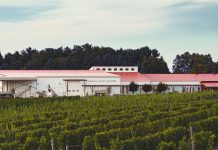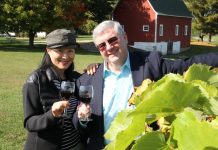
If there’s one thing Fenn Valley Vineyards owner Doug Welsch will always remember about the late Leonard Olson, founder of Tabor Hill Winery, it’s his philosophy about selling wine.
“‘You are selling a good time,’” Welsch recalls Olson telling him. “‘When (customers) buy a bottle of wine, whether it’s in your winery or on the shelf, and they take it home and they open it at their dinner table, they have turned an ordinary dinner into a good time.’”
It’s been 50 years since Tabor Hill in Buchanan became the first licensed winery in the state post-Prohibition, and six since Olson’s passing at age 73, but his influence on the Michigan wine industry is still felt.

Olson grew up in Chicago’s South Shore neighborhood and played football at the University of Illinois at Urbana-Champaign before working as a salesperson in the steel industry. His sales route took him through Southwest Michigan, where he eventually switched career paths. In the late 1960s, he and a business partner planted vinifera and hybrid grapes, including Vidal Blanc and Baco Noir, from which they crafted European-style wines. Olson sold Tabor Hill’s first bottle in 1971.
“The concept of just focusing on European, small-quantity, handcrafted wines was totally new to this area,” Welsch says, noting that the few other local wineries at the time predominantly made wine from American Concord and Niagara grapes.
Olson turned out to be a trendsetter.
“We modeled our winery after them,” says Welsch, who established Fennville-based Fenn Valley Vineyards with his dad, William, in 1973. “Everybody pretty much modeled their winery after Tabor Hill.
“The fact that we started out with all French hybrids was an inspiration on the part of Len Olson and Tabor Hill.”
As a winemaker, Olson wasn’t formally trained, but he did travel to Germany in the early 1970s and learn from some of the greats there. He proved himself a talented vintner. One of his wines — Tabor Hill’s Vidal Blanc Demi-Sec — was even served at the White House during Gerald Ford’s presidency.

At Tabor Hill, Olson set the stage for a new era of Michigan winemaking, but the Buchanan business was only the first of his many ventures. After the financial crisis of the late 1970s knocked him down, he partnered with Dave Upton before ultimately selling Upton his remaining share of Tabor Hill in 1982. Over the years, Olson bought and operated other wineries — as well as a brewery — in Southwest Michigan and elsewhere, not all of them successful. Still, his outlook was indomitably sunny, Welsch says.
“The man had an uncanny ability to always look on the bright side of everything, and that was a wonderful thing about him,” Welsch says. “Nothing was impossible to Len Olson. Nothing.”
Near the turn of the century, Olson moved to Louisville, Ky., and started a winery there. He also helped found the Kentucky Grape and Wine Council.
“Basically, he started the wine industry down there, too,” says his son Gunnar.
In 2008, Olson moved back to Southwest Michigan, where he opened Baroda Founders Wine Cellar in 2009 and its offshoot tasting room in St. Joseph in 2013. While he worked in Baroda, Olson lived out his philosophy of “selling a good time.”
“He was a lot of fun,” says Glen Greiffendorf, winemaker at 12 Corners Vineyards in Benton Harbor, who met Olson shortly after he opened Baroda Founders Wine Cellar. “At his winery in the evenings on Fridays and Saturdays, he’d stay open late — way later than other wineries — and it was more like a bar, and he was the bartender. He was always very friendly and just the ultimate host.”
While he knew how to have a good time, Olson took his craft seriously and helped establish Southwest Michigan as the winemaking hub it is today — an outcome he predicted early on.
“He was a visionary,” says his son, who now runs Baroda Founders Wine Cellar. “When I was a kid, … he would always talk about someday there would be 30 or 40 wineries up and down our coast. And kind of funny, just in our trail alone, now there’s (close to 20) of them. And there’s a hundred wineries in Michigan now. So he could actually see that coming.”













Facebook Comments